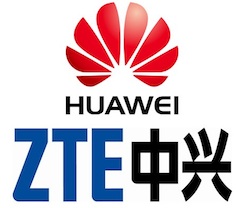BEIJING – US security fears over two China telecom firms have spotlighted Western suspicions Chinese companies are state-influenced, a culture clash analysts say could loom larger as the country’s businesses look overseas.
Telecommunications equipment firms Huawei Technologies and ZTE were put on the defensive this month by a US Congressional committee that labelled them potential national security threats that should be excluded from government contracts and barred from acquisitions in the United States.

Huawei — a private company founded by a People’s Liberation Army veteran — and ZTE — publicly traded and less than 16 percent state invested, according to the corporation — have denied they pose any such security risk.
But countless Chinese companies remain either majority state-owned or maintain intricate government links, a fact noted even by ZTE itself.
ZTE spokesman David Dai Shu said in a statement that the committee’s finding that the company may not be free of state influence, “would apply to any company operating in China”.
Analysts said the issue could become a recurring stumbling block as more Chinese firms look for expansion opportunities abroad — especially in sensitive sectors — just as China is increasingly viewed as a strategic US rival.
“We’ve never had a country with a one-party state and a very large state sector that has played such an important role in the global economy, that has been in a position to make investments around the world,” said Patrick Chovanec, professor at Tsinghua University’s School of Economics and Management in Beijing.
Worries over Chinese companies buying into US industries considered strategic have scuttled past deals, as in 2005 when state-owned China National Offshore Oil Corp (CNOOC) tried to take over US oil major Unocal.
More recently, President Barack Obama last month blocked a Chinese-led group from purchasing several wind farms near a US naval station, saying the acquisition threatened national security.
“Such decisions by the United States will affect the enthusiasm of Chinese companies to invest in the United States,” Chinese ministry of commerce spokesman Shen Danyang said.
The distrust stems from what is seen as an increasingly assertive China that is pouring money into building up its military and, US defence officials have warned, its ability to potentially use high-tech means to disrupt US communications or information systems.
China already has been accused of being a major source of international computer hacking and cyberattacks, although Beijing denies involvement.
Compounding the issue is the generally opaque nature of many Chinese companies, which often seem secretive in the west, where there is more pressure for corporate transparency.
“They can either operate according to the logic that works in China or they can operate according to the logic that works in the US,” said Scott Harold, a China expert at the US-based Rand Corporation.
“But sometimes they will not be able to operate according to both logics simultaneously since they’re incompatible.”
A research report by Fitch Ratings said US sales for Huawei and ZTE account for less than five percent of their revenues and the House committee move was unlikely to immediately affect their bottom lines.
“A more meaningful impact could arise if more countries decide to avoid the Chinese manufacturers over alleged national security concerns,” they wrote.
Just after the US Congressional report release, Canada said it had invoked a “national security exception” that could exclude Huawei from a role in helping build a new secure government network, as the country rebuilds networks damaged by cyber attacks in 2010.
Australia earlier this year blocked Huawei from bidding for contracts on a huge national broadband network.
Analysts said security is a legitimate concern when assessing foreign investment in areas such as telecoms with bearing on national security. But there is a danger that protectionist sentiments could get out of hand, harming Chinese companies that pose no threat, said John Lee, an expert on China’s political economy and foreign policy.
“The decision of the House committee can potentially be misused by various groups in the West to justify protectionism, to justify irrational fear of foreign investment, particularly Chinese investment, so it’s very important that that doesn’t occur,” said Lee, of the University of Sydney.
Anti-China rhetoric is climbing in the US, especially as the presidential campaign kicks into high gear with both candidates seeking to emphasise their tough-on-China credentials.
A broader impact on Chinese companies has yet to emerge, but Chovanec said excessive anti-China feelings could be counter-productive for the US economy.
“There are Chinese companies that have made investments in the United States, have contributed to jobs in the United States. It would be a shame if they were tarred by the same concerns that we ran into here (with Huawei and ZTE),” he said.
Insight: A Convenient Scapegoat – Why All Cyber Attacks Originate in China
Related: Huawei Calls for Global Security Standards
Related: China’s Huawei Responds to US Hackers
















